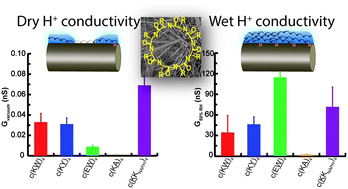Sequence dependent proton conduction in self-assembled peptide nanostructures†
Abstract
The advancement of diverse electrochemistry technologies depends on the development of novel proton conducting polymers. Inspired by the efficacy of proton transport through proteins, we show in this work that self-assembling peptide nanostructures may be a promising alternative for such organic proton conducting materials. We demonstrate that aromatic amino acids, which participate in charge transport in nature, unprecedentedly promote proton conduction under both high and low relative humidity conditions for D,L α-cyclic peptide nanotubes. For dehydrated networks long-range order of the assemblies, induced by the aromatic side chains, is shown to be a dominating factor for promoting conductivity. However, for hydrated networks this order of effect is less significant and conductivity can be improved by the introduction of proton donating carboxylic acid peptide side chains in addition to the aromatic side chains despite the lower order of the assemblies. Based on these observations, a novel cyclic peptide that incorporates non-natural naphthyl side chains was designed. Self-assembled nanotubes of this peptide show greatly improved dehydrated conductivity, while maintaining high conductivity under hydrated conditions. We envision that the demonstrated modularity and versatility of these bio inspired nanostructures will make them extremely attractive building blocks for the fabrication of devices for energy conversion and storage applications, as well as other applications that involve proton transport, whether dry or wet conductivity is desired.


 Please wait while we load your content...
Please wait while we load your content...